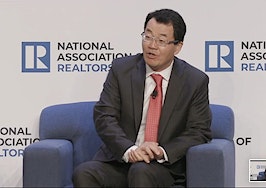New markets require new approaches and tactics. More than 250 experts and industry leaders will take the stage at Inman Connect New York in January to help you navigate the market shift — and prepare for success in 2023. Register today.
The home finance market is changing much faster than most people realize.
Call it alt-finance, proptech, or fintech — it really doesn’t matter. What the real estate industry should know is the most painful, service-deficient aspect of buying and owning a home is finally evolving. But thanks to a slowdown in the real estate economy, changes may be a little slower to come, a fact that drove conversation at Inman Connect Now on Nov. 17.
It’s true that a couple of major players, Knock and Ribbon, have had dramatic staff reductions amid a slowdown in home sales. But, the die has been cast. The line of organizations lining up to use it is only getting longer. Nevertheless, market activity declines do seep their way into the innovation space.
Moderator Clelia Peters was joined by Eddie Lim, a Silicon Valley-based serial entrepreneur who founded a home equity investment company called Point, after he found himself rattled by the traditional process of trying to access home equity.
Lim’s primary frustration rests on the idea that the sheer volume of home equity suggests it should be easier to leverage.
“Ironically, in U.S. real estate, there is $28, $30 trillion in home equity out there; it’s the biggest asset class in the world,” Lim said. “And it doesn’t have equity financing.”
Peters pointed out that Lim’s success and collective expertise also provide him a unique vantage point from which to scan the proptech marketplace. As someone who relied on financing to start multiple companies, Lim knows how the venture capital and financing sector works.
“A lot of investors are in a wait-and-see mode, [but] in the real estate world, a lot of investors are pulling back in large part because the securitization markets have shut down,” he said.
Lim believes that tourist investors, money-people stopping by the proptech space to see what all the fuss is about, have left. It’s back to fundamentals.
Granted, “back to fundamentals” can be considered by some to be code for “we’re in trouble.” Peters asked Lim about that, citing reported distress companies are under, specifically fintechs entwined with the real estate market.
Lim didn’t dismiss it.
“You’re right,” he said. “We’re seeing pain in lots of areas.”
Lim said any business relying on a unique financing model — or any lending practice — for real estate should be worried, noting that Wells Fargo reported a 90 percent drop in mortgage business.
While the new money taps may be freezing at the moment, it was August at Inman Connect Las Vegas when Peters herself reminded the industry that there has been plenty of money raised already, and it’ll need to be deployed.
“The smart investors are thinking about what they want to own two years from now,” Lim said. “What do I want to buy today knowing where rates are going to go and where home prices are going to go, two, three, four years from now?”
To get what’s out there, though, Peters said financiers need to be educated on the value of new fintech models and how they’ll make a positive difference. That starts with knowing the customer.
For example, a Point customer is someone who could simply benefit from more money in their pocket, whether it’s to pay for education, make improvements, pay down retail debt or merely have cash on hand. Customers of Point don’t need to pay back what they borrow for 30 years if needed.
“The no-monthly payment feature is the big ah-ha moment for customers,” Lim said. “Our homeowners, after we make this investment, we see on average that their non-mortgage debts decrease by 20 percent across our base, and it’s maintained for years after.”
Naturally, the capitalization of home equity poses a risk to the collective future wealth of America’s homeowners. It can be argued that savvy startups have discovered an astronomically deep pool of money and hatched clever ways to skim from it. Peters asked Lim about that.
It’s about partnership, he said.
“This environment is accelerating the idea of someone being a partner with you in the homeownership stack,” he said, “in the same way a company goes public and has retail investors holding shares in the company.”
Lim equates that consumer sentiment with the reason iBuyers managed to take hold, as well as other transaction alternatives filling the marketplace.
Tapping into home equity as a stable source of income in uncertain times can help homeowners better manage during an uncertain market. Credit cards can be paid down, for example, alleviating high-interest debt payments while coping with inflation.
Peters pointed out that the idea of “home” is evolving. It’s more than a roof over your head and a long-term wealth creator. It’s an active, dynamic asset with an ever-changing role.
And that’s an idea that real estate agents can start communicating to their clients.









